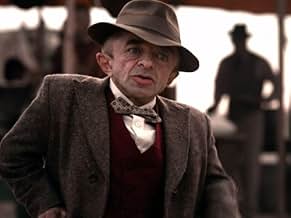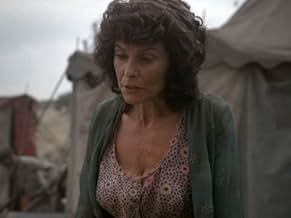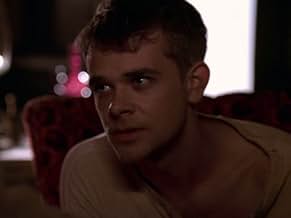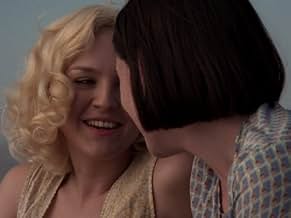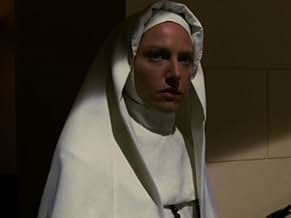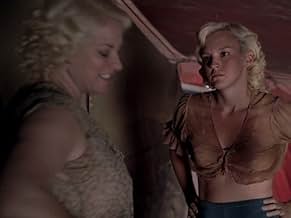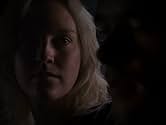Pendant la Grande Dépression, un garçon de ferme d'Oklahoma et un prêtre charismatique apprennent qu'ils sont des acteurs clés dans une guerre entre le ciel et L'enfer.Pendant la Grande Dépression, un garçon de ferme d'Oklahoma et un prêtre charismatique apprennent qu'ils sont des acteurs clés dans une guerre entre le ciel et L'enfer.Pendant la Grande Dépression, un garçon de ferme d'Oklahoma et un prêtre charismatique apprennent qu'ils sont des acteurs clés dans une guerre entre le ciel et L'enfer.
- A remporté 5 prix Primetime Emmy
- 14 victoires et 26 nominations au total
Histoire
Le saviez-vous
- AnecdotesThe intro at the beginning of each show is so intricate and complex it took months to assemble.
- GaffesWhenever "Russian" dialogue is heard, most of it is just gibberish.
- Citations
[Opening lines of the series]
Samson: Before the beginning, after the great war between Heaven and Hell, God created the Earth and gave dominion over it to the crafty ape he called man. And to each generation was born a creature of light and a creature of darkness. And great armies clashed by night in the ancient war between good and evil. There was magic then, nobility, and unimaginable cruelty. And so it was until the day that a false sun exploded over Trinity, and man forever traded away wonder for reason.
- ConnexionsFeatured in Making 'Carnivàle': The Show Behind the Show (2003)
Seasons Reviewed: Complete Series (2 seasons)
The forces of light and dark are about to come face to face. In the 1934 Great Depression, a traveling carnival picks up a quiet loner. That loner, Ben Hawkins (Nick Stahl), slowly learns that he possesses an awesome power and with the help of ringleader Samson (Michael J. Anderson), blind Professor Lodtz (Patrick Bauchau) and the carnival's all-knowing "management" begins to hone it and understand the role he might play in the coming end times. Meanwhile Methodist preacher Brother Justine (Clancy Brown, in a tour-de-force that pushes the entire series forward) believes that he has become a personal instrument of God and, when his missionary is burned down, sets out on a journey that takes him to hell and back.
"Carnivale" starts out an endurance trial and ends up a flawless and addictive piece of work. HBO has made its mark giving us unique serial shows that challenge the audience, but I might argue that "Carnivale" is one of their very best. First of all, it is a supernatural period piece and if that seems weird you haven't seen weird until you've seen creator David Knauf so committed in channeling David Lynch in one of the show's many complex, surrealistic and seemingly random dream sequences.
Second of all, what we are seeing here is a leisurely paced story that is rolled-out, for the most part, visually. TV is so much of a dialog and character-based medium that it is the rare daredevil series that even attempts, much less succeeds (as Lynch's own "Twin Peaks" did before it), in unfolding its story through clever visual cues with a freeing loose grasp on whether it makes any realistic sense. "Carnivale" is a visual work of art.
The show is best viewed like a 3-act, 24 hour movie and without knowing the first thing about any of it. In the first season, creator Daniel Knauf takes his sweet time getting things started. The show takes every inch of the freedom afforded by HBO to stretch out its story at a snail's pace and it doesn't help that our lead, Hawkins, spends much of the season mute and disgruntled. At this point it indulges in such absurd HBO staples as making us sit through an entire funeral service and in the other hand gives us a peak at the potential brilliance behind the show, such as when we see Samson conducting a Carney Trial.
The one thing you need to take from this review in the show's first expository hours is that, yes, "Carnivale" really does go somewhere. Those of us that have sat through self-indulgent serial shows (that shall remain nameless) that spin their wheels for hours, taking us nowhere, will find "Carnivale's" focus refreshing. It turns out Knauf is carefully arranging the pieces.
Before the first season ends he, having effectively stretched this rubber band as far as he can, snaps it back and the show kicks into high gear. The action shuttles back and forth between both the carnivale criss-crossing the country and Brother Justine's rise to cult power and does so with such equal leverage that you could make a case for either being the A-story. When the two words finally come together in the very last episode (a rip-roaring finale at that), it is as satisfying and powerful as anything you'll see. The 2nd season pays off all the promises at the end of the first and lives up to all the potential of this show's weird, wild, brilliantly creative premise. It is riveting, mesmerizing, unforgettable television. Season 2 is flawless.
True, some of the major elements like the demonization (literally) of fundamentalist Christians and the nature of Stahl's power, are things we've seen many times before. Yet, "Carnivale", with its fresh twists on them and epic-scale writing that languishes in a bath of details, makes a case that they are telling the definitive version of this story.
"Carnivale" is an absolute kick. I love the brazen oddity of the show. That in this carnival those with spectacular powers - like the tarot card reader (Clea Duvall) who, with the help of her catatonic mother, can really read the future - are in the mix side-by-side with shysters like Stumpy (Toby Huss), who whores out his wife Rita Sue (Cynthia Ettinger) and daughter Libby (Carla Gallo) in a seedy burlesque show. The dysfunctional relationship that emerges between this lot and ferris wheel operator Jonsey (Tim DeKay, in a gruff hero mode) parses out the supernatural elements and becomes an unexpected emotional core. We've also got Carney staples like the lizard man, the rubber boy, the he-she and the proverbial bearded lady. That doesn't include the show's best character, but I'll leave the identity of "management" to your discovery.
In addition to the reality-breaking set pieces (my favorite being a long, freaky sequence involving Evander Geddes, a tied down Stahl and Death Masks), the show's cinema quality expands to careful cinematography and lush scenery. The camera cranes over actors and landscapes as if the quick-cut MTV editing style never existed. Composer Jeff Beal's original score (including the theme music for one of TVs most spectacular opening title sequences) is gorgeous and truly creepy. The package is indistinguishable from any theatrical film.
Despite an abrupt cancellation and HBO's BS explanation for it, "Carnivale" is still remarkably satisfying, coming full circle in both seasons. There isn't a lot of straight-up weirdness on the small screen and "Carnivale" is much appreciated for it. I've honestly never seen anything like it before. An addicting masterwork of imagery and storytelling that even HBO rarely hits. Great TV.
* * * * / 5
- liquidcelluloid-1
- 27 août 2006
- Lien permanent
Meilleurs choix
Détails
- Date de sortie
- Pays d’origine
- Site officiel
- Langues
- Aussi connu sous le nom de
- Carnivàle
- Lieux de tournage
- sociétés de production
- Consultez plus de crédits d'entreprise sur IMDbPro
- Durée1 heure
- Couleur
- Mixage
- Rapport de forme
- 1.78 : 1


